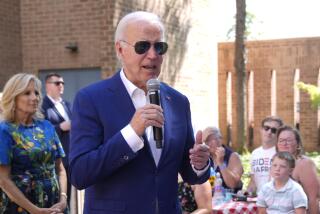Mayors Tell of Perot Promise to Rebuild Cities
- Share via
DALLAS — After a two-hour meeting Monday with undeclared presidential candidate Ross Perot, five big-city mayors said he promised to make rebuilding the cities his No. 1 priority if he is elected in November.
Perot apparently made no commitment to back specific programs during the meeting, which took place at his invitation to discuss urban problems in the wake of April’s rioting in Los Angeles.
But the Texas billionaire, whose prospective independent run for the presidency has turned the political world upside down, did promise that “his No. 1 priority would be to rebuild the cities and re-industrialize the country,” San Diego Mayor Maureen O’Connor said. Perot also pledged to meet with the mayors again in “the near future” to go over “detail by detail” the seven-point, $34.8-billion proposal backed by the U.S. Conference of Mayors to stimulate employment and generally speed recovery from the recession.
Perot also promised, O’Connor said, that if elected he would “absolutely” appoint a diverse Cabinet that included women.
“Ross Perot is a powerful force in the politics of 1992,” said Boston Mayor Raymond Flynn, a Democrat and president of the mayors’ group. Perot “understands very clearly” the importance of cities to the health of the American economy, Flynn said.
Perot said, according to Flynn, that if elected he would meet each month with mayors, whom he described as being “on the front line” of the nation’s urban problems.
In addition to O’Connor and Flynn, the other mayors in attendance were Michael White of Cleveland and Sharpe James of Newark, N.J.--all Democrats--and independent Xavier Suarez of Miami, who supported President Bush in the 1988 campaign.
During the meeting, Perot promised to keep in such close touch with urban problems that “you mayors are going to get sick of me,” the executive director of the U.S. Conference of Mayors, Tom Cochran, quoted him as saying.
For the mayors, the chief advantage of the meeting was publicity for concerns that they feel have been largely overlooked by the Bush Administration and the public.
“Perot is a hot item in America today and we are trying to get our issues put on the front burner,” Flynn said.
White and Sharpe, who are committed to supporting Democratic prospective nominee Bill Clinton, said they hoped that the meeting would pressure Clinton to be more responsive to their proposals for urban aid.
Perot’s willingness “to talk about the problems of the cities, to talk about a domestic agenda, to talk about education, to talk about day care, means that the Bill Clinton whom I support is going to have to be more specific about what he is going to offer minorities,” said James, who is black.
“I think I am in a better position to sit with Bill Clinton and advise him, having heard Ross Perot face to face, than I would if I just dreamed that the Democratic Party is going to be the salvation of African-Americans,” James said, adding that he has been unable to create excitement about Clinton among blacks. “The biggest thing in our community today is apathy. They are turned off,” he said.
All the mayors indicated that they hoped that the gathering with Perot would prod Bush into granting them a similar audience in the White House.
As for Perot, the meeting gave him a chance to broaden his image as a Western range rider and tough-talking tycoon and to demonstrate his concern for the the cities and the citizens who live there--including a large number of minorities, a constituency that up till now has been relatively slow to climb aboard his bandwagon.
Asked where the money for the cities would come from, Flynn said that, like the money used for the bailout of the federal savings and loans and foreign aid, it would “have to come from the taxpayers.”
“What we’re saying is that it’s time to begin spending American money on Americans,” White said.
More to Read
Get the L.A. Times Politics newsletter
Deeply reported insights into legislation, politics and policy from Sacramento, Washington and beyond. In your inbox twice per week.
You may occasionally receive promotional content from the Los Angeles Times.







